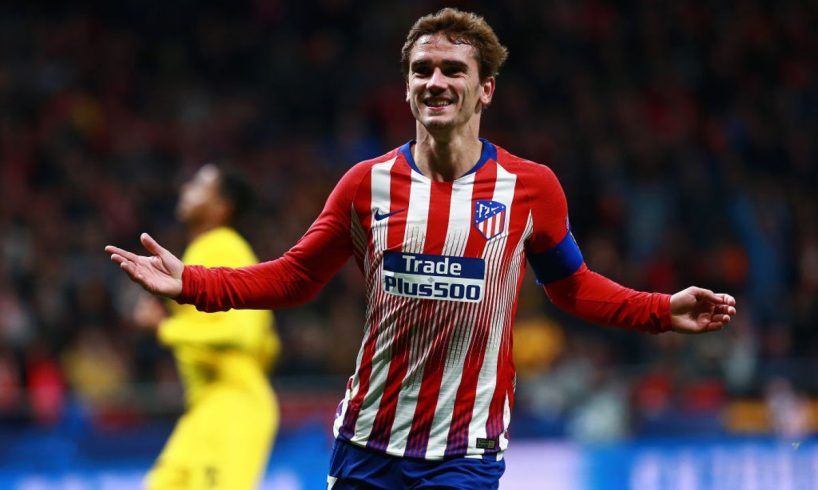
Antoine Griezmann of Atletico Madrid celebrates scoring against Borussia Dortmund in the 2018-19 Champions League group stages (Getty Images)
Over the last few weeks, Atletico Madrid staff have sensed an old fire in Diego Simeone. He has spent almost every spare moment scrutinising Borussia Dortmund, seeking to figure out the otherwise indiscernible little gaps in Edin Terzic’s team.
It’s that familiar vigour and immersion that hasn’t been fully apparent in some time, probably because it takes a proper Champions League tie to bring it out. That’s accompanied by exhilarating old tension around the club, but that also comes from something new – or at least refreshing.
This is just the fourth time Atletico and Dortmund have been drawn together, and only the second this millennium. That last meeting was just in the 2018-19 group stage, too, despite the two clubs being ever-presents in the Champions League since then.
It certainly stands out amongst the other quarter-finals. Arsenal and Bayern Munich have been drawn together five times in 12 years, and that despite a seven-year gap. Barcelona and Paris Saint-Germain are meeting for the sixth time across the same spell, which will make it 12 games in all. Worst, and most intensely, Real Madrid and Manchester City are meeting for the fourth time in five years.
While such an intimacy between the English and Spanish champions would usually invigorate numerous storylines around the game – especially given it could end up being seen as “the real final” – the problem is that we’re too familiar with it all. We have seen and heard it all before. No one needs to be told about Pep Guardiola’s relationship with Real Madrid again. City, meanwhile, got their grand revenge last season.
That isn’t to say it won’t be good football, but such repetition fosters the growing debate about the staleness of the Champions League. This is much more of an issue than abolishing the away goal. It has been one of the problems of the modern Champions League, with too many of the same teams, characters, matches, and even cities. That almost seems to go against the spirit of European football, which was historically about the new and the different, as well as great voyages of discovery.
The competition could do with more major ties that have a sense of the unknown about them.
And yet that points to another twist in the Atletico-Dortmund tie, that adds an even greater excitement.
The familiarity in the other three games is largely because they are clubs that are generally always around this stage, and should be thinking about winning. Arsenal are an exception this season in how they’re back at the quarter-finals for the first time since 2010, but it scarcely feels a one-off. They’re here to stay, as illustrated by the fact they’re almost considered second favourites just because they’re the next Premier League team after City. There’s an elevated financial power there.
Despite playing in their first quarter-final since 2010, Arsenal are seen as among the favourites for the Champions League by extension of the Premier League’s power (Getty)
None of this is the case for Dortmund or Atletico, bar the long wait. Dortmund haven’t been to the semi-final since 2012-13. Atletico haven’t been that far since 2016-17.
That gap is all the more significant since it was that last Atletico semi-final that arguably closed an era. In the half-decade before that, both of these clubs had marked themselves out as the continent’s great upstarts. They were the great counter-forces, appropriately deploying counter-attack and counter-pressing.
Both showed how to defy the economic realities of the game. Dortmund had done more than just disrupt Bayern’s dominance in Germany. They had become the only other team to win two successive Bundesliga titles in 16 years. That was all through an exhilarating young team driven by Jurgen Klopp.
Simeone’s Atletico weren’t quite so stirring, but they had an admirable doggedness that saw them become the first club other than Real Madrid and Barcelona to win La Liga in a decade. In the context of what the game had become, these were authentically impressive upsets, the contemporary equivalents of Jose Mourinho’s Champions League with Porto and maybe even Sir Alex Ferguson’s Scottish titles with Aberdeen. The achievements secured the legacies of both Simeone and Klopp, while launching them into that strand of elite managers.
Simeone and Klopp had extraordinary success with Atletico and Dortmund but suffered heartbreaking defeats in the Champions League finals that would have capped their achievements (Getty Images)
Those legacies could have been even grander, too, since both came within inches of going the full distance in the Champions League. Dortmund got to the 2013 final, only to be beaten by an 89th-minute winner. Atletico were on the brink of winning the 2014 final, only to concede a 93rd-minute equaliser and then collapse. Two years later, they were beaten on penalties at the same stage.
The more relevant detail, for a number of reasons, is that it was their greatest rivals that subjected them to this pain. Bayern beat Dortmund through Arjen Robben’s winner. Real Madrid equalised in 2014 through a Sergio Ramos header from a set-piece, and that against a Simeone side. Atletico then lost the psychodrama of penalties in 2016, their bigger rivals at Madrid of course keeping their focus.
These were the worst ways to lose, to cap their best modern eras. It wasn’t even like they were spared the opposite scenarios of Bayern beating Atletico or Madrid beating Dortmund. Ironically, in fact, the reverse had happened in the runs to those finals. Dortmund destroyed Real Madrid in the 2012-13 semi-final. Atletico shut out Bayern in the 2015-16 semi-final.
The fact they had come so close almost illustrated a psychological difference, that would turn into a gap that was much more real.
The fact that last semi-final was in 2017 was not a coincidence. It was a direct consequence of the actions of clubs like Bayern, and Real Madrid above all. After Michel Platini had been forced to resign as Uefa president in 2016, the biggest clubs used the vacuum to claim more power – and money. It was in this period when a system was agreed where 30 per cent of Champions League prize money would be distributed according to performance in the last decade of the competition. Bonus points were even awarded for previous European trophies. This is still seen as an absolutely pivotal moment, that turned an open competition into a more of a closed shop, and also influenced the turn towards the Super League.
Although both Dortmund and Atletico were invited into that ill-fated project, they would have very much been junior partners. They were now getting a lot less money from their regular European appearances. That is where the twist comes in this game, too.
Simeone has been invigorated by Atletico’s return to the Champions League quarter-finals (Getty)
Dortmund and Atletico both feel they have the best chance of reaching a semi-final for the first time in this era, despite having teams that are well short of their previous glory eras. If only Klopp or Simeone’s first great side had benefited from such draws, rather than fighting for almost everything. One might even end up with their first final since that era, too, since they are on the more forgiving side of the bracket.
There’s a considerable irony here, if also an element of throwback. It shows the luck of the draw that European football should be more about.
It adds an extra dimension to the game. Both sense opportunity because of the problems of the other. There’s a symmetry there. They’re both hovering around fourth place, toiling to get back into the Champions League.
It is why there’s been a renewed vigour to Simeone. Everyone recognises the opportunity this tie represents. There’s certainly no sense of staleness about the Champions League for either of these clubs.
It could mean the dynamics of this tie are closer to the Internazionale-Atletico game in the last 16, but that would be no bad thing. It was the best tie of the entire round.
It was what the Champions League needs more of – which is what Wednesday’s meeting in Madrid represents.






